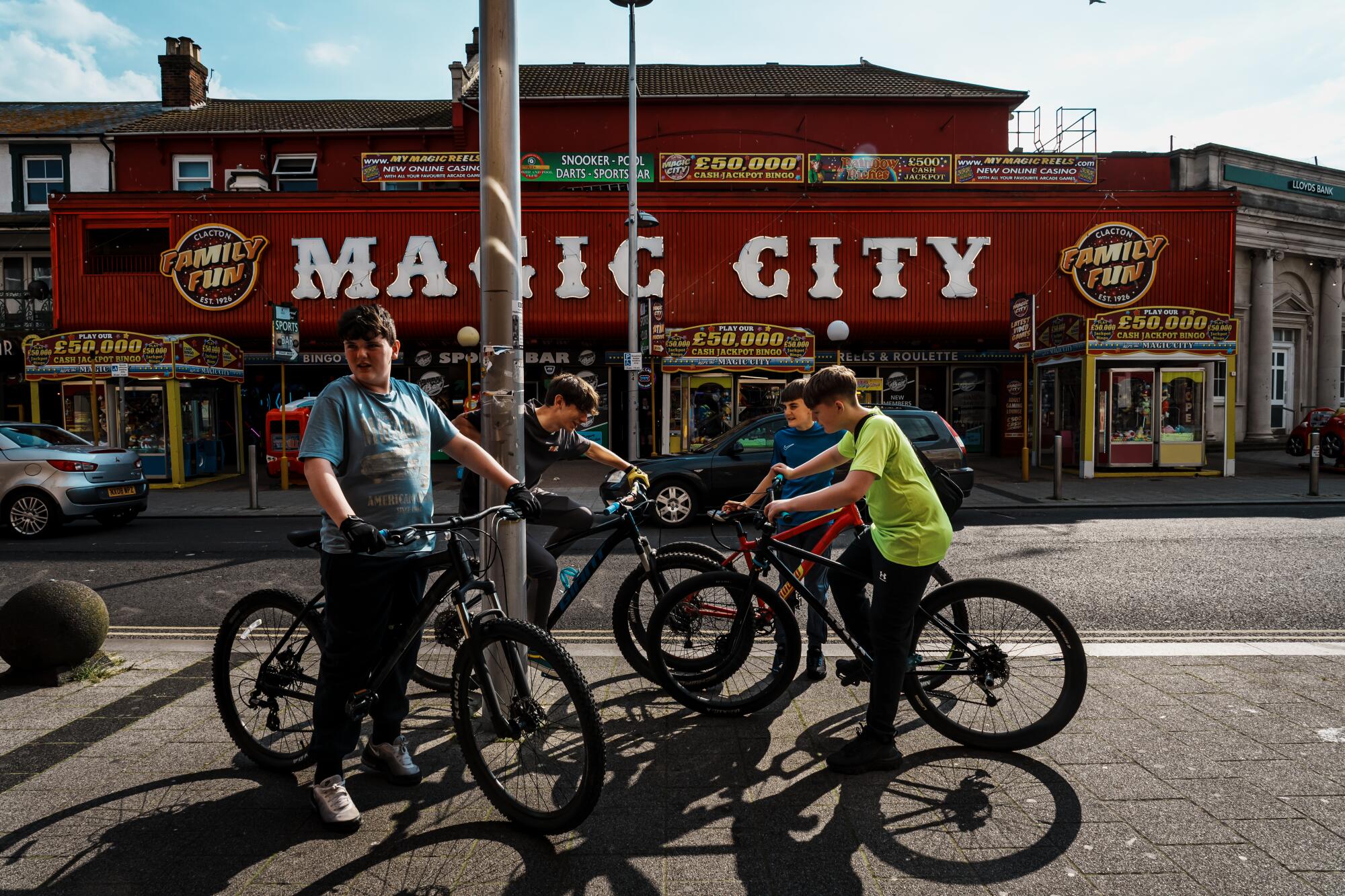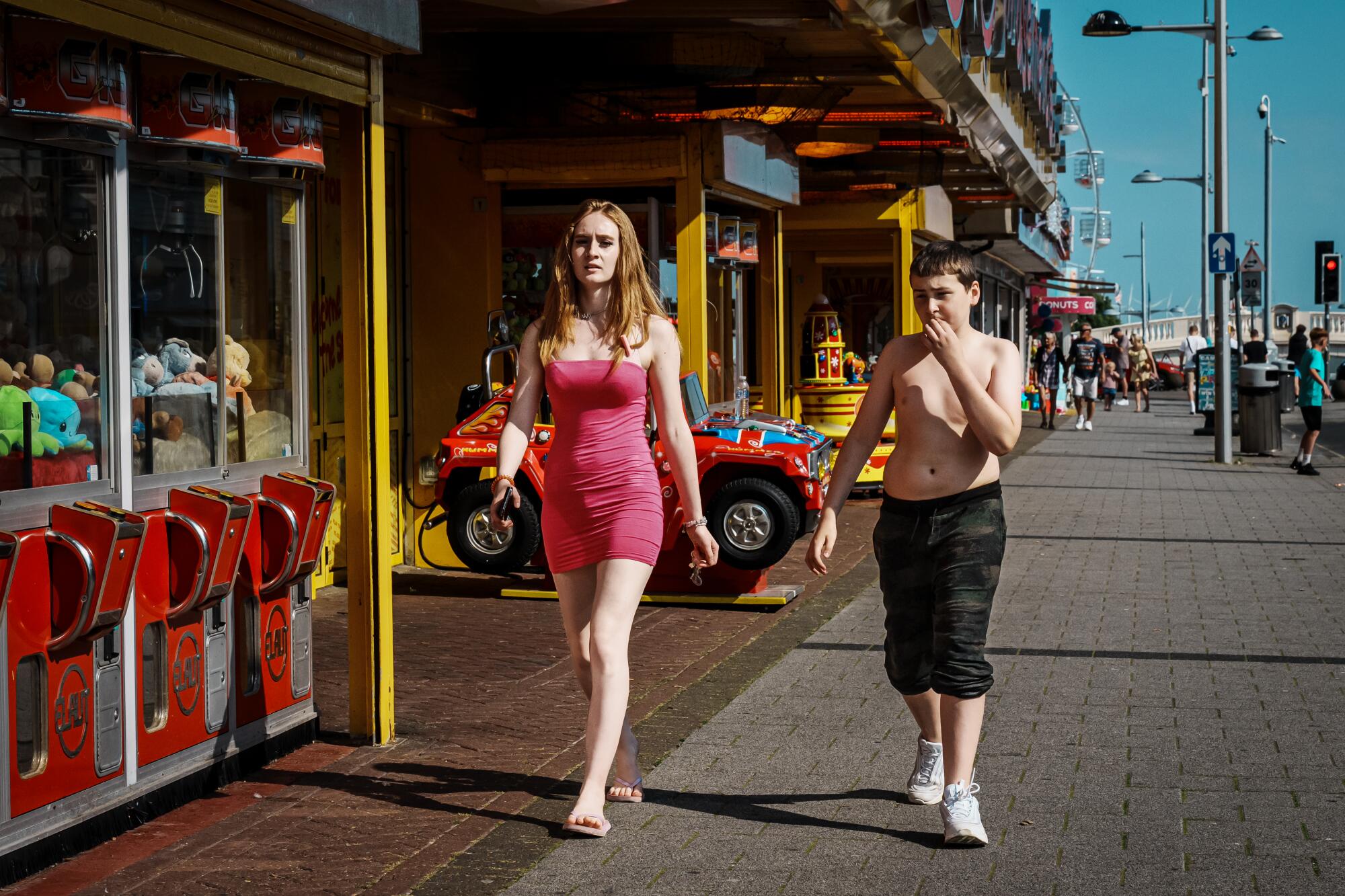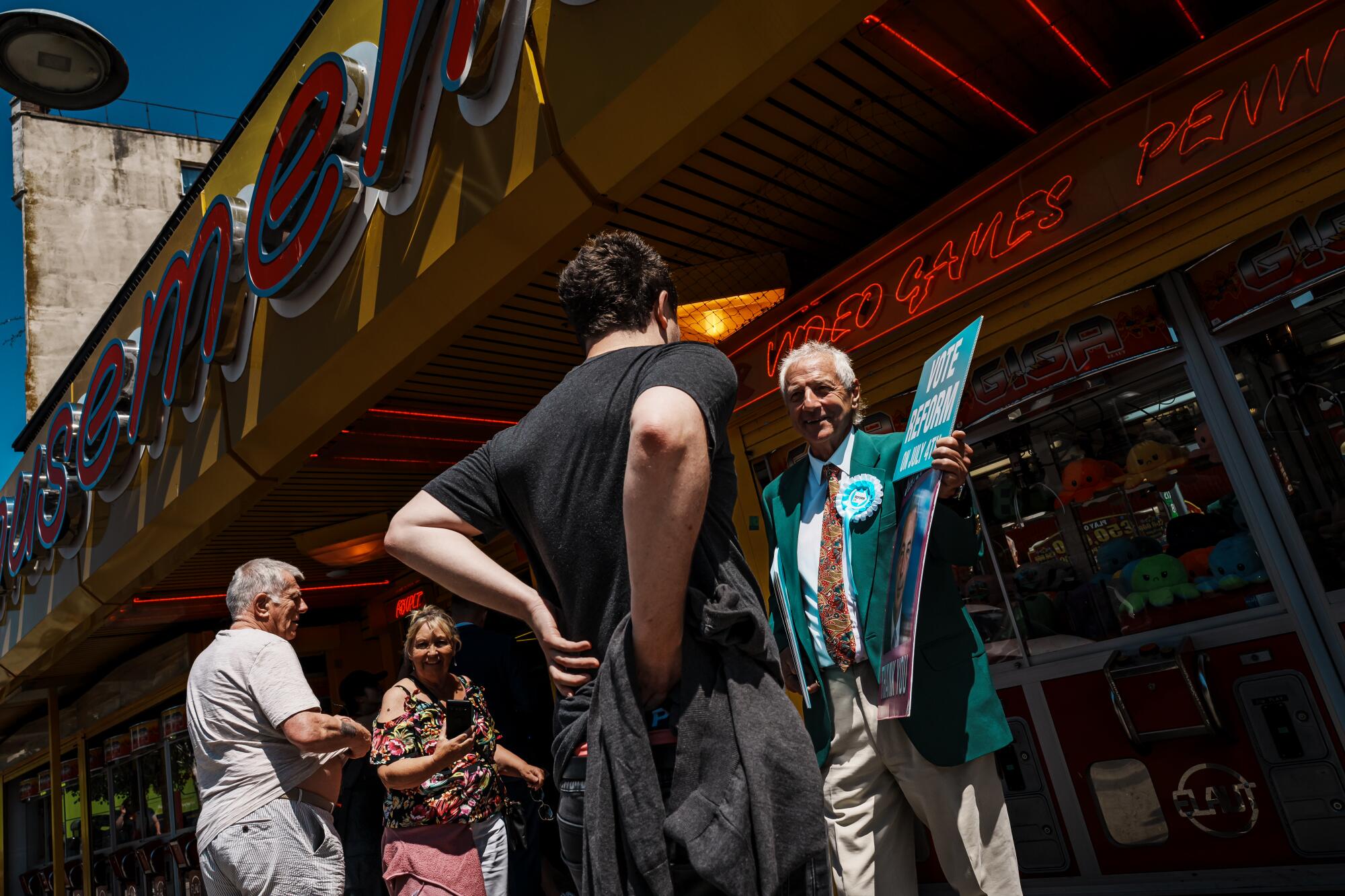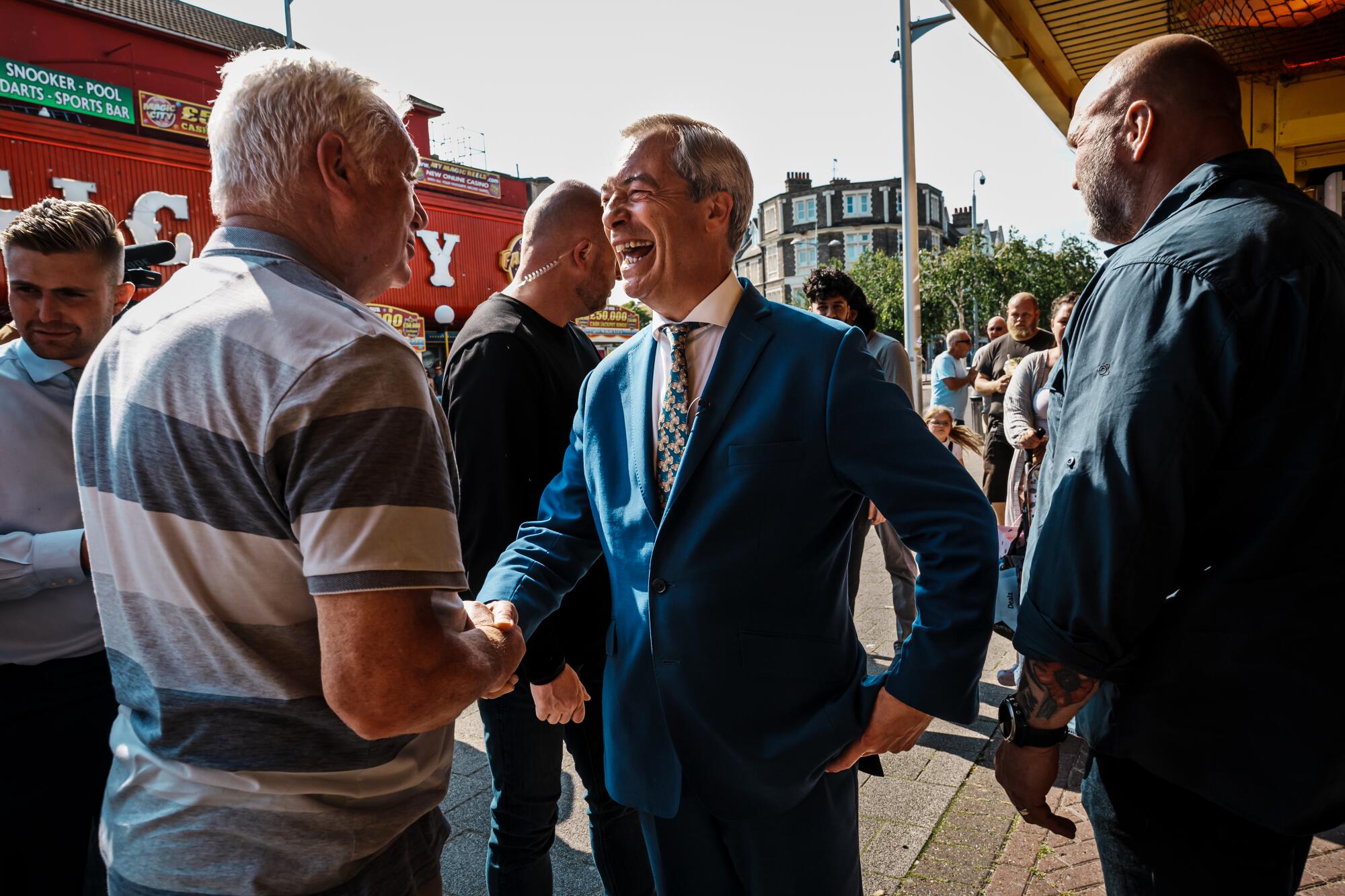In a sludgy, slow-motion trajectory, the pale yellow milkshake found its mark: Far-right political candidate and Donald Trump acolyte Nigel Farage, on the inaugural day of his insurgent campaign for a seat in the British Parliament.
But no display of airborne voter displeasure was going to prevent one of the country’s most gleefully polarizing public figures from shaking up what had until then been considered a fairly sedate contest between Britain’s two biggest parties. In a surprise announcement in early June, Farage inserted himself as the ruling Conservatives were already forecast to lose decisively to the left-leaning Labor Party.
Some observers believe the return of Farage, 60 — political flamethrower, a key architect of Brexit, leader of a small, stridently anti-immigration party — could lead to a MAGA-like takeover of the Conservative Party, which has played a preeminent role in British politics for nearly 200 years.
Nigel Farage, leader of the anti-immigration Reform U.K. political party, plays a game at an amusement arcade below his party’s office in Clacton-on-Sea, England.
And his high-profile presence re-introduces an insistently clamorous voice to what has lately been a nationalist-populist upswelling in Western Europe and beyond, one whose full import may soon become clear.
“He’s good at getting attention, and he sees himself as a disrupter, someone who wants to overthrow the established order,” said Mark Wickham-Jones, a political science professor at the University of Bristol. “There’s not much coherence to his policies, but in terms of his support, that really doesn’t matter.”
Public opinion polls suggest Farage’s party, Reform U.K., will come nowhere near victory in Thursday’s general election. But after seven straight losses, he appears poised to succeed — finally — in winning election to the House of Commons, the 223-year-old lower house of Parliament.
Farage, who hails from a leafy village on London’s outskirts, is making his eighth parliamentary run in Clacton-on-Sea, a down-at-the-heels seaside town whose jangling arcades, shuttered storefronts and scuffy, darting seagulls can lend it the air of a distorted funhouse mirror. (In Britain, parliamentary candidates do not have to live in their constituencies.)

Boys on bicycles hang out near the main street in Clacton-on-Sea. The town and its surrounding villages are afflicted by high unemployment and poverty.

People walk by one of the many amusement arcades near the beach in Clacton-on-Sea.
“Something is happening out there — momentum!” Farage recently told a group of sweaty, enthusiastic supporters at his tiny local headquarters, situated above one of the many garish amusement arcades lining a seaside street.
“It’s like millions of simultaneous conversations are going on, at the breakfast table, at the bingo hall, at the pub — ‘Oh my God, we were just talking about you!’” he said, sounding almost giddy.
In many ways, Clacton is an electoral venue tailored for Farage.
The town and its surrounding villages, while containing some affluent pockets, are afflicted overall by high unemployment and poverty rates. In the 2016 Brexit referendum, 70% of the constituency voted to leave the European Union. Two years earlier, Reform’s predecessor, the United Kingdom Independence Party, or UKIP, won a parliamentary race for the first time — in Clacton.
In a political pattern that has become familiar in the United States and continental Europe, voters in Clacton, which is home to relatively few migrants, tend to be far more vociferous than the general population in demanding that immigration be cut dramatically.
Farage “has been able to play on people’s fears,” Wickham-Jones said, “and concerns about identity — a sense that society has been changing rapidly.” Other politicians, he said, have struggled to articulate a counternarrative about the social benefits of immigration, or less drastic ways of curtailing it.

David Allum, right, canvasses for British politician Nigel Farage outside Reform’s office, above an arcade center in Clacton-on-Sea.
The Labor candidate in Clacton is a charismatic 27-year-old named Jovan Owusu-Nepaul, who was born in the English town of Nottingham and is of Jamaican and Ghanaian heritage. He is seen as having little chance of overtaking Farage, although some political observers believe his quick-witted, social-media-heavy campaign style marks him as someone who could ascend the national stage at some point.
On a Clacton side street, Pushkar Dhasmala, a 40-year-old immigrant from India, said he supported Owusu-Nepaul but knew that most of his neighbors did not.
“The care sector is dependent on immigrants,” said Dhasmala, who works in a privately run assisted-living facility. Farage’s opponent, he said, “understands the situation” faced by those newly arrived and trying to make a home in Britain.
Labor’s expected dominance in the national parliamentary vote bucks a recent trend of nationalist-populist success elsewhere in Europe. The party has been buoyed by a wave of public disaffection with the Conservatives, whose nearly 15 years in power spanned the pandemic and Britain’s chaotic exit from the European Union, formalized in 2020.
Over the years, the Conservatives imposed hard-edged austerity measures that have gutted Britain’s public sector, including the revered but deeply troubled National Health Service. The Conservative-held prime ministership changed hands repeatedly during the tussle to enact Brexit, culminating in the scandal-plagued reign of Boris Johnson, who stepped down in disgrace in 2022.
Johnson’s successors fared little better: First came the hapless Liz Truss, the shortest-serving leader in modern British history, whose 50-day tenure inspired memes of whether she would outlast a wilting head of lettuce, and current Prime Minister Rishi Sunak, who called the upcoming vote when it became clear that cratering Conservative support could plunge even further.

Nigel Farage plays an arcade game. The anti-immigration politician, who hails from a leafy village on London’s outskirts, is making his eighth parliamentary run in the down-at-the-heels seaside town of Clacton-on-Sea.
The reemergence of Farage — who jumped into the parliamentary race after first saying he would not run — coincides with bruising times for mainstream political leaders elsewhere in Western Europe.
In France, President Emmanuel Macron is trying to hold shut the far-right floodgates in two rounds of parliamentary voting finishing on July 7; Germany’s centrist government suffered a stinging rebuke when a far-right party notched second place in the country’s European parliament elections this month.
There has sometimes been a certain synchronicity in American and British politics — Brexit’s narrow approval came months before Trump’s 2016 presidential victory — and prominent Trump backers have taken delighted notice of far-right gains in France, Germany, Italy and elsewhere.
Before, during and after the former U.S. president’s turn in office, Farage worked strenuously to insert himself into the Trumpian orbit, albeit as something of a distant satellite.

Nigel Farage’s sloganeering echoes Donald Trump’s — “make Britain great again.”
In a recent interview with Britain’s ITV, Farage declared that Trump had likely “learned a lot” from his own incendiary, insult-laden speeches in the European parliament, where he previously held a seat — but added, magnanimously, that the tutelage went both ways.
Farage’s sloganeering echoes Trump’s — “make Britain great again” — and he relishes describing the country as being in a state of terminal decline and branding opponents “boring idiots.”
Trump, for his part, was an avowed fan of Brexit, and his campaign hinges on many of the same social divisions that animate Farage’s run: immigration, economic dissatisfaction and culture wars.
Some political commentators, and Farage himself, have suggested the voting results might leave him positioned to essentially capture a hollowed-out Conservative party — a scenario likened by some to events across the Atlantic, where Trump’s MAGA movement has seized control of the Republican establishment.
“Post election, there may be a bid for forces from Reform to stage some kind of takeover of the Conservatives, perhaps involving Farage if he is elected” as a member of Parliament, said Andrew Blick, a politics and contemporary history professor at King’s College London.
“I don’t know if this will be successful, but if it were, the Conservatives would look more like the Trump-era Republicans,” he said. That would leave a victorious Labor party and prospective new prime minister, Keir Starmer, facing a far more extremist and intransigent political opposition.
For all the fandom that can be seen out on the campaign trail, Farage triggers strong negative pushback from across much of the political spectrum. He has been pilloried for saying NATO provoked Russia’s war against Ukraine, for blatantly misogynistic remarks, and for repeated expressions of what critics call thinly veiled racist sentiments.
“You don’t have to watch sheepdog trials to hear a dog whistle,” former Conservative Prime Minister David Cameron said of Farage, speaking to the Times of London.
On the day Farage began his campaign in Clacton, a young female onlooker, who was later arrested, splattered him with a milkshake on the steps of a well-known seaside pub, the Moon and Starfish. This was not the first milkshaking of Farage’s career, and he handled the incident with a degree of aplomb, grinning for cameras later that day with an order of banana milkshakes in hand.
Three weeks later, though, the man who made bellicosity his political trademark was clearly still harboring a grudge.
“Politics has changed,” he said. “People hurl things at you.”
His divisiveness was attested to by a Clacton couple who were dining on a recent afternoon on the terrace of the pub where the milkshake episode occurred.
Paula Bracegirdle, a part-time cook who said she hoped to retire soon, had qualms about Farage — “a bit extreme, I think,” she said. But her husband, Paul, 60, who works part-time with elderly people with dementia, called him a truth-teller.
“I think he’s straight with what he says,” he said.
They disagreed on Brexit, too: She voted in 2016 to remain in the EU. He supported the Leave campaign that Farage helped spearhead, and like Farage, he now blamed the Conservatives for having failed to manage the departure effectively.
The pair agreed on one thing, though: Clacton, they both said, was no better off than before.


















![Ep266: [Lean Series] How to Plan a Responsible Fat Loss Phase Ep266: [Lean Series] How to Plan a Responsible Fat Loss Phase](https://carrotsncake.com/wp-content/uploads/2024/06/Carrots-N-Cake-VIP-Nutrition-Coaching-768x1040.jpeg)
.jpg)

Discussion about this post